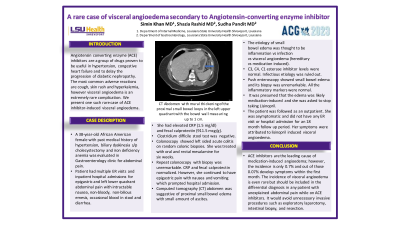Tuesday Poster Session
Category: Small Intestine
P4163 - A Rare Case of Visceral Angioedema Secondary to Angiotensin-Converting Enzyme Inhibitor
Tuesday, October 24, 2023
10:30 AM - 4:00 PM PT
Location: Exhibit Hall

Has Audio

Simin Khan, MD
Louisiana State University Health
Shreveport, LA
Presenting Author(s)
Simin Khan, MD1, Shazia Rashid, MD2, Sudha Pandit, MD2
1Louisiana State University Health, Shreveport, LA; 2LSU Health Sciences Center, Shreveport, LA
Introduction: Angiotensin converting enzyme (ACE) inhibitors are a group of drugs proven to be useful in hypertension, congestive heart failure and to delay the progression of diabetic nephropathy. The most common adverse reactions are cough, skin rash and hyperkalemia, however visceral angioedema is an extremely rare complication. We present one such rare case of ACE inhibitor-induced visceral angioedema.
Case Description/Methods: A 38-year-old African American female with past medical history of hypertension, biliary dyskinesia s/p cholecystectomy and iron deficiency anemia was evaluated in Gastroenterology clinic for abdominal pain. Patient had multiple ER visits and inpatient hospital admission for epigastric and left lower quadrant abdominal pain with intractable nausea, non-bloody, non-bilious emesis, occasional blood in stool and diarrhea. She had elevated CRP (1.5 mg/dl) and fecal calprotectin (911.5 mcg/g). Clostridium difficle stool test was negative. Colonoscopy showed left sided acute colitis on random colonic biopsies. She was treated with oral and rectal mesalamine for six weeks. Repeat colonoscopy with biopsy was unremarkable. CRP and fecal calprotectin normalized. However, she continued to have epigastric pain with nausea and vomiting which prompted hospital admission. Computed tomography (CT) abdomen was suggestive of proximal small bowel edema with small amount of ascites. The etiology of small bowel edema was thought to be inflammation vs infection vs visceral angioedema (hereditary vs medication induced). C3, C4, C1 esterase inhibitor levels were normal. Infectious etiology was ruled out. Push enteroscopy showed small bowel edema and its biopsy was unremarkable. All the inflammatory markers were normal. It was presumed that the edema was likely medication-induced and she was asked to stop taking Lisinopril. The patient was followed as an outpatient. She was asymptomatic and did not have any ER visit or hospital admission for an 18 month follow up period. Her symptoms were attributed to lisinopril induced visceral angioedema.
Discussion: ACE inhibitors are the leading cause of medication-induced angioedema; however the incidence is only 0.7% and out of those 0.07% develop symptoms within the first month. The incidence of visceral angioedema is even rare but should be included in the differential diagnosis in any patient with unexplained abdominal pain while on ACE inhibitors. It would avoid unnecessary invasive procedures such as exploratory laparotomy, intestinal biopsy, and resection.

Disclosures:
Simin Khan, MD1, Shazia Rashid, MD2, Sudha Pandit, MD2. P4163 - A Rare Case of Visceral Angioedema Secondary to Angiotensin-Converting Enzyme Inhibitor, ACG 2023 Annual Scientific Meeting Abstracts. Vancouver, BC, Canada: American College of Gastroenterology.
1Louisiana State University Health, Shreveport, LA; 2LSU Health Sciences Center, Shreveport, LA
Introduction: Angiotensin converting enzyme (ACE) inhibitors are a group of drugs proven to be useful in hypertension, congestive heart failure and to delay the progression of diabetic nephropathy. The most common adverse reactions are cough, skin rash and hyperkalemia, however visceral angioedema is an extremely rare complication. We present one such rare case of ACE inhibitor-induced visceral angioedema.
Case Description/Methods: A 38-year-old African American female with past medical history of hypertension, biliary dyskinesia s/p cholecystectomy and iron deficiency anemia was evaluated in Gastroenterology clinic for abdominal pain. Patient had multiple ER visits and inpatient hospital admission for epigastric and left lower quadrant abdominal pain with intractable nausea, non-bloody, non-bilious emesis, occasional blood in stool and diarrhea. She had elevated CRP (1.5 mg/dl) and fecal calprotectin (911.5 mcg/g). Clostridium difficle stool test was negative. Colonoscopy showed left sided acute colitis on random colonic biopsies. She was treated with oral and rectal mesalamine for six weeks. Repeat colonoscopy with biopsy was unremarkable. CRP and fecal calprotectin normalized. However, she continued to have epigastric pain with nausea and vomiting which prompted hospital admission. Computed tomography (CT) abdomen was suggestive of proximal small bowel edema with small amount of ascites. The etiology of small bowel edema was thought to be inflammation vs infection vs visceral angioedema (hereditary vs medication induced). C3, C4, C1 esterase inhibitor levels were normal. Infectious etiology was ruled out. Push enteroscopy showed small bowel edema and its biopsy was unremarkable. All the inflammatory markers were normal. It was presumed that the edema was likely medication-induced and she was asked to stop taking Lisinopril. The patient was followed as an outpatient. She was asymptomatic and did not have any ER visit or hospital admission for an 18 month follow up period. Her symptoms were attributed to lisinopril induced visceral angioedema.
Discussion: ACE inhibitors are the leading cause of medication-induced angioedema; however the incidence is only 0.7% and out of those 0.07% develop symptoms within the first month. The incidence of visceral angioedema is even rare but should be included in the differential diagnosis in any patient with unexplained abdominal pain while on ACE inhibitors. It would avoid unnecessary invasive procedures such as exploratory laparotomy, intestinal biopsy, and resection.

Figure: CT Abdomen with mural thickening of the proximal small bowel loops in the left upper quadrant with the bowel wall measuring up to 1 cm.
Disclosures:
Simin Khan indicated no relevant financial relationships.
Shazia Rashid indicated no relevant financial relationships.
Sudha Pandit indicated no relevant financial relationships.
Simin Khan, MD1, Shazia Rashid, MD2, Sudha Pandit, MD2. P4163 - A Rare Case of Visceral Angioedema Secondary to Angiotensin-Converting Enzyme Inhibitor, ACG 2023 Annual Scientific Meeting Abstracts. Vancouver, BC, Canada: American College of Gastroenterology.
